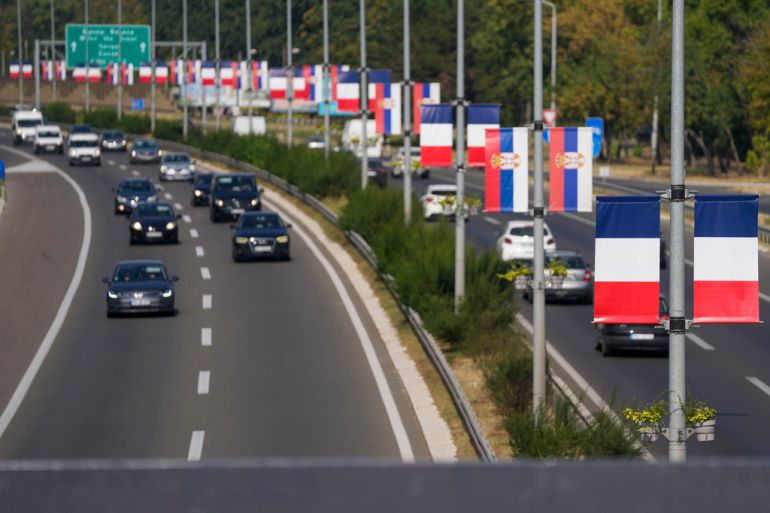Serbia and France sign $3bn deal for sale of French fighter jets
Sale comes as European nations try to coax Serbia away from traditional ally and weapons supplier Moscow.
French and Serbian flags fly on lampposts on a highway in Belgrade, Serbia, on Thursday, August 29, 2024, before French President Emmanuel Macron two-day state visit to Serbia [Darko Vojinovic/AP Photo]Published On 29 Aug 202429 Aug 2024
France and Serbia have signed a $3bn agreement for the sale of 12 French-made Rafale fighter jets, as European countries try to coax Serbia away from close ties with Russia.
The landmark sale, signed by Serb Defence Minister Bratislav Gasic and Dassault Aviation CEO Eric Trappier on Thursday, comes as French President Emmanuel Macron visits Belgrade in a bid to bolster ties between the two nations.
Keep reading
list of 3 itemsend of list
“We are happy to become part of the Rafale club. We thank the president of France for making this decision and for enabling us to purchase the new Rafales,” Serbian President Aleksandar Vucic told reporters during the signing.
Macron says that the move will help bring Serbia, which has maintained close political and economic ties with Russia for years, closer to the European Union (EU). Thursday’s deal marks the largest weapons sale to Serbia, a frequent buyer of Russian weapons, since 2006.
The French leader called the deal an act of “strategic courage” and a “true demonstration of European spirit”.
Critics have said that the deal rewards an increasingly autocratic government in Belgrade that continues to embrace revisionist narratives about past human rights abuses and harbour territorial ambitions that threaten the integrity of its neighbours.
The deal could help advance Serbia’s efforts to modernise its military, long reliant on Soviet-era technology and military hardware.
Belgrade has moved away from military cooperation with Moscow since Russia launched a full-scale invasion of Ukraine in February 2022, but has not joined other European states in issuing sanctions.
Serbia has expressed interest in joining the EU, but those ambitions have been set back by issues such as corruption, the rule of law, and thorny relations with neighbouring Kosovo, which declared its independence from Serbia in 2008 in a move that angered Serb nationalists.
The Vucic government has recently faced street protests against a potential lithium mining project, viewed positively by the EU and previously suspended following large demonstrations in 2022.
